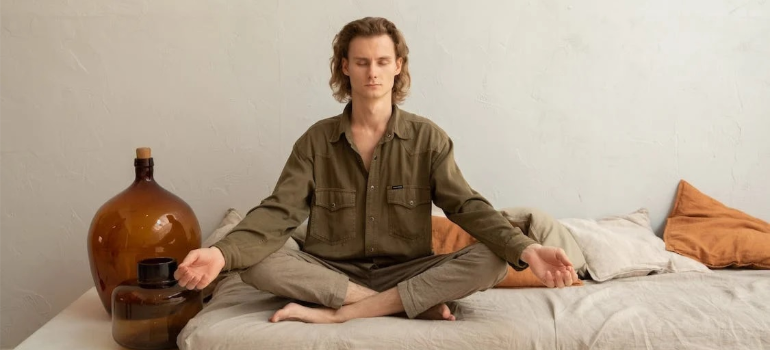Cognitive Behavioral Therapy
Delve into the world of Cognitive Behavioral Therapy (CBT) for substance use disorders, a remarkably potent addiction treatment tool. Uncover the reasons behind its high effectiveness and transformative impact with Harmony Ridge.
Substance abuse happens when a person doesn’t drink or take drugs properly. This form of substance misuse includes excessive consumption or incorrect use of alcohol, prescription medicine, and other legal and illegal substances. Unfortunately, alcohol abuse and drug abuse can lead to what is called a substance use disorder (SUD) – otherwise known as drug addiction. It’s this unfortunate phenomenon that addiction treatment institutions, like our own West Virginia treatment center, increasingly need to address.

Thankfully, as science has evolved in strides, there are now multiple ways to treat addiction. Treatment centers often deploy a wide variety of clinical support through therapeutic interventions, including cognitive behavioral therapy for substance use disorders. Often abbreviated as CBT, this method is one of the most common and best-studied forms of psychotherapy. CBT combines both the therapeutic approaches of cognitive therapy and behavioral therapy to promote cognitive restructuring. It caters to patients with SUDs, mental health disorders, or both – in cases of dual diagnosis. Working with a CBT therapist, such patients are empowered to overcome their maladaptive behavior patterns that result in drug abuse.
How Does Cognitive Behavioral Therapy Work?
Cognitive-behavioral therapy is a type of psychotherapy that helps individuals overcome negative thought patterns that lead to substance use. During treatment, patients with a substance addiction are guided through finding connections between their thoughts, feelings, and emotions and their actions.
In addition to addiction, CBT is among the behavioral therapies used to treat mental health conditions. Therefore, a CBT treatment plan for substance abuse is often included in addiction treatment plans for those who require dual diagnosis treatment.
This type of treatment requires that addiction and any other mental health conditions are treated at the same time. Unfortunately, according to NIDA’s findings, this phenomenon is fairly common; 37.9% of those with SUDs also have a mental health disorder, and 18.2% of those with mental health disorders also have an SUD.
To address this, cognitive behavioral therapy for substance use disorders focuses on treating mental health disorders like:
- Anxiety
- Bipolar disorder
- Depression
- Eating disorders
- Personality disorders and borderline personality disorders
- Schizophrenia
- Trauma
- Autism
- OCD
- ADHD
- PTSD

A cognitive-behavioral approach is helpful for addicted persons who do not understand why they feel or act a certain way. When included in an addiction recovery plan, this form of therapy ends the need for drug use when negative emotions emerge. Further, CBT consists of two theories: cognitive therapy and behavioral therapy.
A brief history of cognitive behavioral therapy

To explain this in more specific terms, here we can quickly outline the history of CBT. This will be fairly brief and simplified, but it should help explain how today’s CBT treatment plan for substance abuse came to its current form.
- In 1913, behaviorist John B. Watson began work that would later evolve into behavioral psychoanalysis.
- In 1938, a component of CBT in behavior therapy (BT) saw use in a controversial treatment for youth enuresis by Bolla, Sartore, and Correale.
- By the 1950s, Albert Ellis had started practicing a CBT-adjacent practice in Rational Emotive Behavior Therapy (REBT). Behaviorist BF Skinner’s operant conditioning theories (1948) informed both CBT and REBT.
- In the 1960s, Dr. Aaron T. Beck’s psychoanalytic experiments on cognitive distortions fathered CBT as we know it today. His work was also influenced by Joseph Wolpe and Arnold Lazarus.
- In 1991, Clark and Watson brought forth the Tripartite Model, which cognitive behavioral therapy for substance use disorders evolved through. Multimodal therapy, which identifies 7 modalities of psychological disorders, and the 5-point model variant, both derive from this initial model.
- By the 2000s, CBT literature had evolved in strides. Such studies as Gaudiano’s brought forth a new wave of CBT – on which current therapies largely rely.
The Steps and Benefits of Addiction Treatment CBT
Overcoming substance use disorders is a process and will involve steps. Treating substance with cognitive behavioral therapy typically follows what is called the “ABC model.” This model stands for:
A: activating event
B: beliefs about the event
C: consequences of your behavior
This type of cognitive behavioral therapy for substance use disorders hinges on changing the B, or beliefs. This is because negative thoughts can influence maladaptive behavioral patterns. For example, many patients turn to drugs as a result of negative thinking. They may interpret a particular situation as a sign of them being inadequate.
Through engaging in CBT techniques, such patients learn to separate themselves from the A, or activating event, through various coping skills. By failing to internalize things they cannot control, patients are better equipped to focus on positive emotions instead of faulty beliefs. This enables patients to avoid high-risk situations through practicing acceptance of events.
Identify difficult conditions in your life.
These types of situations can range from grief and divorce to a medical condition or mental illness. Have a discussion with your therapist to set goals and pinpoint essential needs.
Be aware of your emotions, thoughts, and behaviors about these conditions.
Once you have identified the life situations you want to focus on, your mental health professional will ask you how you feel about them. This discussion is the essence of any CBT treatment plan for substance abuse and may dive into how you interpret situations and the beliefs you have about yourself and others. You may also evaluate your own “self-talk,” what you tell yourself about an event or occurrence.
Recognize inaccurate or negative thoughts and beliefs.
Your counselor will ask you to observe your behavior and ways of thinking about the previously identified situations, helping you identify problematic thought patterns. Your therapist will then help you change these negative thoughts and beliefs.

Some find this step to be the most difficult one because you might have been thinking the same way about things for a long time. You will have to identify your behavioral and thought patterns, and then your counselor will question whether these views are based on fact or an incorrect perception. This crucial step takes practice, but more helpful ways of thinking will come naturally to you over time. As they do, holistic addiction therapy can take hold and help you re-discover your inner self.
Contact Us TodayCognitive Behavioral Therapy for Substance Use Disorders
Cognitive-behavioral interventions are an effective treatment for various types of addictions to many different substances. CBT focuses on how thoughts influence a person’s mood, which causes them to make behavioral decisions. This is a highly useful relapse prevention tool – one on which any robust CBT treatment plan for substance abuse will focus.

A patient who is trying to overcome their addictive behaviors will eventually find themselves in difficult situations. Just as anyone experiences, they may, for example, fight with a partner. This activating event can lead to thoughts such as: “I’m not good enough,” or “I’m a terrible partner.” These thoughts are largely unhelpful and lead to a deterioration in mood.
When an individual indulges in these negative thought patterns, they are more likely to try and dull their pain by using drugs. Rather than defaulting to dysfunctional and distorted thinking, CBT techniques allow a patient to perceive the world around them in a more reasonable manner.

Beyond emotional healing, CBT finds effective use in an array of addiction treatments. Examples include:
- Alcohol addiction. Alcohol rehab WV services typically include CBT, as Alcohol Use Disorder (AUD) responds to it well.
- Cocaine addiction. Addiction to cocaine is highly behavioral, leaving ample room for CBT in cocaine addiction rehab.
- Fentanyl addiction. Given fentanyl’s sheer potential for misuse and relapse, behavioral therapy often begins soon after fentanyl detox treatment.
- Heroin addiction. As the field grows, increasingly more heroin rehab centers employ cognitive behavioral therapy for substance use disorders.
- Ambien addiction. Typically less severe than addictions to more powerful substances, Ambien rehab still employs CBT to great effect.
- Barbiturates addiction. Needing to uproot addiction to notably powerful depressants, barbiturates rehab will often feature a CBT treatment plan for substance abuse.
- Benzodiazepine, or “benzo”, addiction. Up against similarly potent depressants, benzo rehab often relies on psychotherapy to ensure recovery.
- Marijuana addiction. Among the most socially acceptable, but still highly behavioral, addictions today, marijuana addiction responds well to CBT included in marijuana rehab West Virginia
- Stimulants addiction. Virtually every respectable stimulants addiction rehab center will now offer some form of psychotherapy against this persistently addictive type of drug.
- Opiate addiction. A subgroup of opioids, which fuel the ongoing opioid crisis, these drugs often require the CBT services of an established opiate rehab center.
- Methamphetamine, or “meth”, addiction. As every meth rehab center West Virginia offers will attest to, this gripping addiction does respond well to CBT.
Techniques for Cognitive Behavioral Therapy for Substance Use Disorders
CBT for substance abuse generally includes various types of techniques and behavioral strategies. The skills gained in this type of cognitive therapy are effective in producing positive changes and can be used for the rest of your life. Working with a therapist that specializes in clinical psychology, your CBT treatment plan for substance abuse will teach you the following coping skills and techniques:
Relaxation Techniques
During a CBT session, you will likely learn relaxation techniques. This type of skills training helps patients in recovery by providing alternatives to drugs when they feel stressed. These techniques can include the following:
- Drawing or painting
- Deep breathing
- Listening to music
- Exercising
- Gardening
- Taking a bath
Relaxation techniques are different for everyone. The main goal is that what you do replaces addictive behaviors. What one person finds relaxing may not work for another person. Therefore, it is important that you utilize techniques that work best for your needs.
Guided Discovery
During CBT sessions, your therapists may also use guided discovery. If your therapist utilizes this technique they will interview you about your viewpoint. Then, they will ask questions that challenge your viewpoint. This is meant to help you consider different perspectives that you might not have thought of before. By exploring other ways of viewing a situation, cognitive distortions can be more easily avoided.
Journaling

Cognitive behavioral therapy for substance use disorders can also benefit tremendously from journaling. Writing down how you feel is a useful tool when you are trying to change your thought patterns. Journaling can provide you with insight into your unhealthy patterns of thinking. Additionally, after you receive treatment, you may also want to look back at how your thinking has changed over time. Witnessing your old thought patterns and comparing them to your new ways of thinking can show you how far you have come.
How is CBT Different from Dialectical Behavior Therapy?
Dialectical behavior therapy (DBT) does indeed look similar to CBT, at a glance. DBT is, in fact, rooted in cognitive behavioral therapy, as its definition notes:
“[A] modified type of [CBT, its] main goals are to teach people how to live in the moment, develop healthy ways to cope with stress, regulate their emotions, and improve their relationships with others. […] This type of therapy is also sometimes used to treat post-traumatic stress disorder (PTSD).”
Therefore, a CBT treatment plan for substance abuse may resemble a DBT one. However, DBT was initially developed to treat chronically suicidal individuals with borderline personality disorder (BPD). DBT treated other mental illnesses in time, but most people treated with dialectical behavior therapy were diagnosed with BPD as NCBI finds:
“DBT, a treatment originally developed by Dr. Linehan that is efficacious for chronically suicidal patients with BPD, has been adapted for this patient population. […] DBT and its adaptation may also be effective for SUD patients with multiple, complex problems rooted in emotional dyscontrol who have not responded to other evidence-based approaches.”
Thus, where Cognitive behavioral therapy for substance use disorders focused on cognition and behavior, dialectical behavior therapy emphasized validation or the acceptance of uncomfortable thoughts, feelings, and behaviors instead of going against them. When a person comes to terms with their troubling thoughts, emotions, or actions, they no longer see that change is impossible. They can collaborate with their therapist on a recovery plan.

The role the therapist plays in DBT is to help the individual find a balance between acceptance and change. New skills are also developed, such as coping methods and mindfulness practices. Like individuals treated with cognitive behavioral therapy, people treated with dialectical behavioral therapy are instructed to practice these new ways of thinking and behaving. A crucial part of successful DBT treatment is the improvement of coping strategies, which makes it an excellent tool for drug rehab for veterans and anyone else struggling with trauma and PTSD.
Contact Us TodayHow Does CBT Help Women?
When it comes to substance abuse, women face unique issues due to sex and gender. There are differences based on biology and culturally defined roles for men and women. Scientific studies on drug abuse discovered that women who use drugs could have issues related to hormones, menstrual cycle, fertility, pregnancy, breastfeeding, and menopause. Women also tend to have different reasons for taking drugs. This includes attempts to control weight, manage pain, and exhaustion, and attempts to self-medicate mental health problems. The latter is a key reason why Cognitive behavioral therapy for substance use disorders is often used for dual diagnosis in women as well.
Data support the use of selective serotonin and serotonin-norepinephrine reuptake inhibitors (SSRIs and SNRIs) to treat the premenstrual dysphoric disorder (PMDD) that affects some women. Many women choose not to take this route for a condition that occurs once a month. Side effects from such medications as sexual dysfunction are not appealing. Cognitive-behavioral therapy is helpful to women in treating such premenstrual symptoms because it offers an effective alternative. As it does, a CBT treatment plan for substance abuse also entails the psychological benefits discussed above.

Science has also discovered that women’s substance abuse differs from men’s because they often take smaller amounts of certain drugs for less time before becoming addicted. Sex hormones can cause women to be more sensitive to the effects of drugs compared to men. Females also respond differently to substances. They can experience more drug cravings and can be more likely to relapse after treatment. Women are more likely to be taken to the emergency room from the effects of substance abuse or overdose and are more likely to die. Females that are victims of domestic violence are at a higher risk of substance abuse.
Getting the Most Out of Cognitive Behavioral Therapy for Substance Use Disorders
Contact Us Today
There are different forms of therapy when seeking treatment for a multitude of conditions like substance abuse. Like any other treatment form, cognitive behavioral therapy should not be seen as a guaranteed cure for everyone. It’s up to the person to get the most out of their therapy treatments to recover successfully.
Treat therapy as a partnership.
Be open and honest.
Stick to the treatment plan.
Don’t expect results to be instant.
Do homework between sessions.
Talk to your therapist if it’s not working.
Find Solace at Harmony Ridge Today
At Harmony Ridge Recovery, our approach to treatment is unique and wholly aligned with scientific literature. We use evidence-based addiction treatment practices and a comprehensive-holistic system that includes a tailored CBT treatment plan for substance abuse.
Our recovery center has an experienced team of licensed medical professionals, administrative staff, and management ready to serve you. If you or your loved ones have fallen victim to substance abuse, please contact us today. Together we’ll explore CBT and other case-appropriate therapies, and craft a journey to recovery like no other.
Jump To Section
Begin Your Journey to Healing Here
Ask me about recovery, I can help you!
Our recovery specialists are standing by 24/7 to help you or your loved one.
Or call us: 


